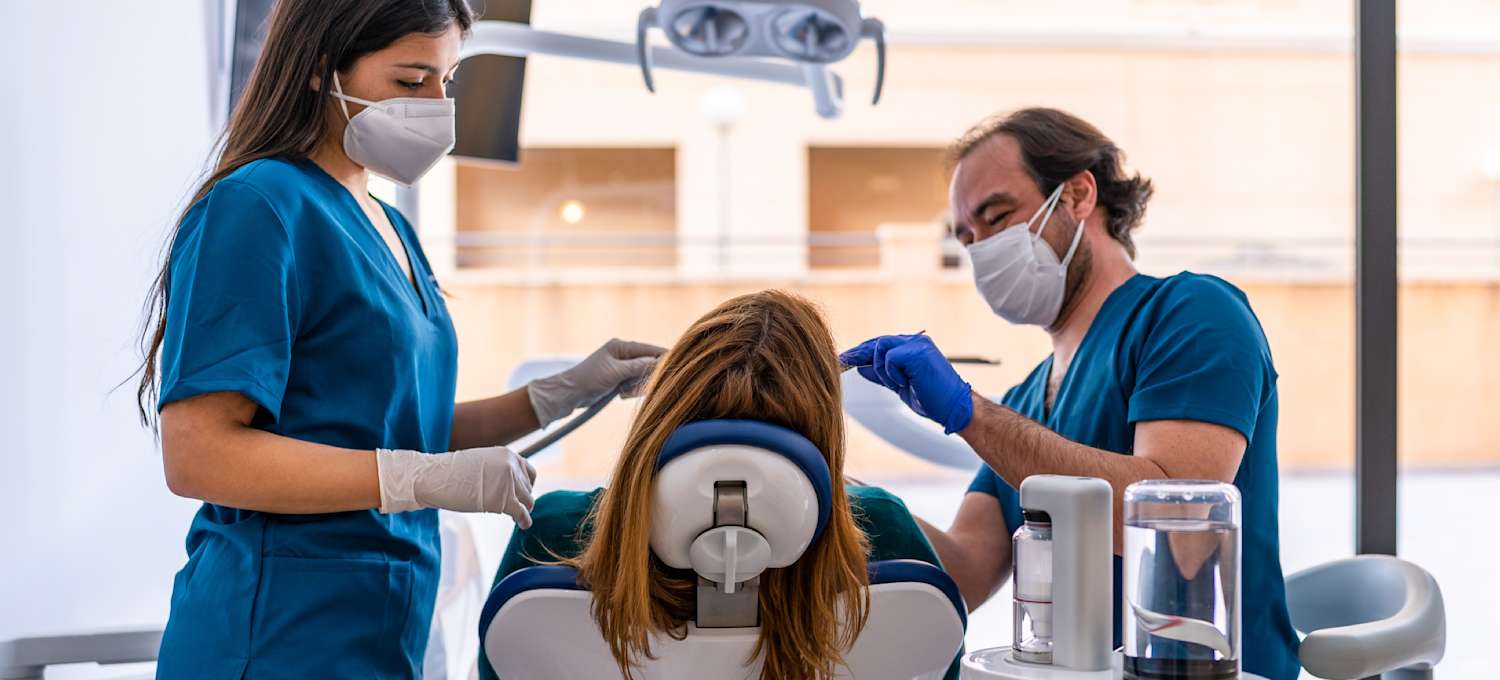How Many Years Does It Take to Study Dentistry in China:It generally takes 5 to 8 years to study dentistry in China, depending on undergraduate and postgraduate pursuits.
Table of Contents

Educational Pathway
Pre-Dental Requirements
To embark on a journey to study dentistry in China, certain pre-dental requirements must be met. High school graduates need to excel in subjects like Biology, Chemistry, and Physics to become eligible for admission into dental schools. Many institutions also expect students to have a satisfactory level of English proficiency.
- High School Diploma: A minimum qualification, usually with a focus on science subjects.
- Science Courses: Strong performance in Biology, Chemistry, and Physics.
- English Proficiency: TOEFL or IELTS scores may be required by some universities.
- Initial Application: Submission of application forms, fees, and necessary documents.
Entry Examinations and Admission Criteria
The next step involves clearing the entry examinations. These tests assess the knowledge and skills essential for dental studies. Different universities may have varying criteria for admissions, and some may even have interviews as a part of the process.
- National College Entrance Examination (Gaokao): A significant criterion for Chinese universities.
- University-specific Exams: Some schools have their tests in addition to the Gaokao.
- Interviews: Potential one-on-one or panel interviews to gauge suitability for the program.
- Admission Offer: After successful completion of all requirements and assessments, an offer of admission is usually extended to the candidate.
Duration of Undergraduate Study
The undergraduate dental program in China usually spans 5 years. However, the exact duration might vary depending on the university and any specialized tracks the student may choose.
- Standard Duration: Generally 5 years in total.
- Specialized Tracks: Some programs offer specialized tracks that may extend the duration.
- Summer and Winter Breaks: These are not counted in the academic duration.
Course Structure
The curriculum of dental schools in China typically comprises theoretical courses, laboratory work, and clinical practice.
- Theoretical Courses: Includes foundational sciences and dental sciences.
- Laboratory Work: Practical sessions for skill development.
- Clinical Practice: Hands-on experience under supervision in later years.
Subjects Covered
The subjects in the undergraduate dental program cover a wide range of topics to provide a comprehensive dental education.
- Basic Sciences: Anatomy, Physiology, and Biochemistry.
- Clinical Sciences: Restorative Dentistry, Oral Surgery, and Periodontics.
- Additional Courses: Ethics, Dental Law, and Practice Management.
Read more about dental subjects
Year-wise Breakdown
The 5-year dental program is usually broken down as follows:
- First Year: Basic Sciences and Introduction to Clinical Practices.
- Second Year: More in-depth Basic Sciences and Initial Laboratory Work.
- Third and Fourth Years: Advanced Clinical Sciences and Patient Care.
- Fifth Year: Internship and Specialized Clinical Practice.

Postgraduate Opportunities
After completing an undergraduate degree in dentistry, there are multiple postgraduate opportunities for further specialization and career advancement in China. These can range from master’s programs to doctoral research in specific dental fields.
- Eligibility: Must have an undergraduate degree in Dentistry.
- Admission Exams: Additional tests or interviews may be required.
- Recommendation Letters: Often required for postgraduate admissions.Master’s Programs
Master’s programs generally last 2 to 3 years and offer advanced training in dental specializations.
- Program Length: Typically 2 to 3 years.
- Core Courses: Advanced subjects like Oral Pathology, Dental Implants, etc.
- Research Requirement: Most programs require the completion of a research project.
Doctoral Programs
Doctoral programs in dentistry are more research-intensive and can take 3 to 5 years to complete.
- Program Length: Usually 3 to 5 years.
- Research Focus: Strong emphasis on original research work.
- Final Defense: Oral defense of the doctoral thesis.
Specializations
Dentistry is a vast field, and there are numerous areas for specialization.
- Orthodontics: Focuses on correcting teeth and jaws that are out of place.
- Periodontics: Concerned with the structures supporting the teeth.
- Pediatric Dentistry: Dental care specifically for children.

Clinical Experience
Clinical experience forms a vital part of dental education in China. It aims to provide students with hands-on experience in patient care, diagnostic procedures, and treatment planning.
- Importance: Helps bridge the gap between theoretical knowledge and real-world applications.
- Timeframe: Usually in the later years of undergraduate studies and during postgraduate programs.
Read more about clinical dental education
Internships
Internships are often mandatory components of dental education. These are short-term, supervised experiences where students work alongside professionals to gain clinical skills.
- Duration: Generally range from 3 to 6 months.
- Settings: Hospitals, dental clinics, and community health centers.
- Tasks: Include patient consultations, basic procedures, and record-keeping.
Residencies
After completing an undergraduate or postgraduate degree, many opt for residencies to receive specialized training.
- Duration: Usually 1 to 2 years.
- Specializations: Areas like orthodontics, oral surgery, and periodontics.
- Supervision: Guided by experienced dental professionals.
Supervised Practice
Before obtaining a license, students undergo a period of supervised practice to polish their clinical skills.
- Timeframe: Typically lasts for a year after graduation.
- Scope: Encompasses a broad array of dental procedures.
- Assessment: Regular evaluations by supervising dentists to gauge competency.
Licensing and Certification
Licensing and certification are crucial steps in becoming a practicing dentist in China. The process ensures that only qualified individuals provide dental care to the public.
- Purpose: To verify the qualifications and competencies of dental graduates.
- Administering Bodies: Usually overseen by the National Medical Examination Center or equivalent organizations.
Read more about dental licensing and certification
National Licensing Exam
To practice dentistry in China, graduates must pass a National Licensing Exam.
- Eligibility: Completion of an accredited undergraduate or postgraduate dental program.
- Exam Sections: Multiple-choice questions, practical assessments, and oral examinations.
- Frequency: Typically conducted annually.
Local Regulations
While the National Licensing Exam is standardized, there may be additional local requirements.
- Provincial Bodies: Some provinces have their regulations and criteria.
- Scope of Practice: Varies depending on local guidelines and policies.
- Additional Exams: Certain areas may require extra certifications for specific procedures.
Continuing Education Requirements
Keeping up with the latest advancements in the field is crucial for maintaining one’s license.
- CME Credits: Continuing Medical Education credits required at regular intervals.
- Subjects: Can include new techniques, ethics, and patient care methodologies.
- Verification: Usually, certificates or credits are issued upon completion of the courses.

International Comparison
While dental education in China has its unique features, it’s often compared to dental programs in other countries. These comparisons provide insights into the global landscape of dental education and allow for mutual recognition of qualifications ,How Many Years Does It Take to Study Dentistry in China.
- Global Standards: China aims to align its dental education with international norms.
- Quality of Education: Often compared with programs in countries like the United States, the United Kingdom, and Australia.
Study Duration in Other Countries
The length of dental programs varies significantly across countries, affecting the time it takes to start practicing.
- United States: Dental programs usually last for 4 years after a 4-year undergraduate degree.
- United Kingdom: An undergraduate dental program typically lasts for 5 years.
- Australia: Varies from 4 to 5 years, often following an undergraduate program.
Mutual Recognition of Qualifications
Recognition of dental degrees and licenses across borders is essential for professionals who wish to practice internationally.
- Treaties and Agreements: Some countries have mutual agreements for recognizing dental qualifications.
- Conversion Exams: Often required to adapt to different healthcare systems and regulations.
- Additional Training: May be necessary to meet the host country’s standards.

